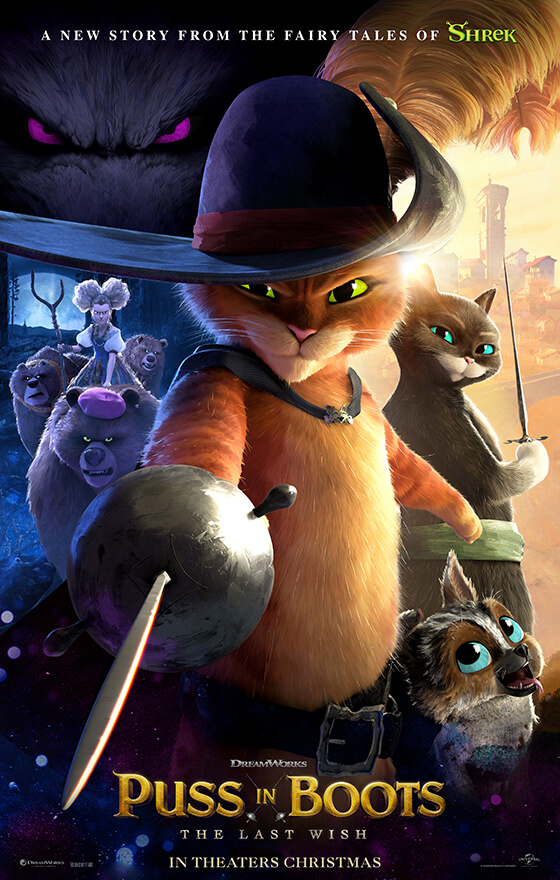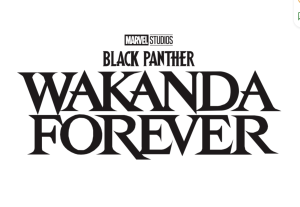‘Puss in Boots: The Last Wish’ Has No Business Being This Good, but I’m Glad It Is
Critically acclaimed with multiple award nominations, the ‘Puss In Boots’ sequel demonstrates that animation is for everyone and mature animation doesn’t have to equal an R rating
UNIVERSAL PICTURES
“Puss in Boots: The Last Wish” stuns audiences with its clever and unique approach to themes of mortality and anxiety in a film primarily marketed toward children.
January 25, 2023
The first scene opens to a merry celebration of a town’s beloved and chivalrous hero. The hero in question sings about his feats and adventures with pride. Even when the festivities awaken an angry giant, the hero defeats him with thrill, laughing in the face of death.
But what ensues after is not a movie about this hero fearlessly saving the day from a big bad monster. Instead, what follows is a beautifully animated lesson about one’s mortality.
To my surprise, this movie is the “Puss in Boots” sequel, “Puss in Boots: The Last Wish.”
Despite being the studio behind some of my childhood favorites such as “How to Train Your Dragon,” “Kung Fu Panda” and “Rise of the Guardians,” I haven’t paid much attention to DreamWorks films in recent years. “Trolls” was mediocre; “The Boss Baby” is universally hated, and “Abominable” was alright at best.
It’s a message that certainly reminds you that death is coming, but it also demonstrates a celebration of life that speaks to viewers of any age.
When “Puss in Boots: The Last Wish” was nominated for Best Animated Feature at both the Golden Globes and the Critics’ Choice Awards, I didn’t bat an eye. But after listening to reviews that said the newest “Puss in Boots” movie was making them believe in “Shrek” and DreamWorks again, I decided to give the film a chance. I was shocked, but also very delighted, to find an incredibly enjoyable film.
Despite his confidence, Puss in Boots, voiced by Antonio Banderas, dies in his fight against the giant. Puss’ “fearless hero” bravado has caused him to squander eight of his nine lives. It is in this movie that he finally begins to realize that death is both very real and very close.
But his realization isn’t muddled with over-the-top outbursts or slapstick comedy. Instead, he struggles in a fight against a bounty hunter (Wagner Moura). In the form of a wolf, the bounty hunter clearly has the upper hand, and Puss slowly loses his cool in the duel. Then, the bounty hunter lands a hit on Puss, drawing actual blood. Puss’ life flashes before his eyes, in hair-raising, hyperventilating fear. It’s a chilling scene, as the fear of death is quite familiar to many.
The intensity of it all is enhanced by the gorgeous, multi-framed animation. Compared to previous films, which favored a more realistic style, “The Last Wish” combines 2D and 3D animation, resulting in an illustrated, paintbrush-like aesthetic that brings the world to life. The inspiration drawn from the critically acclaimed “Spider-Man: Into the Spider-Verse” is especially present in the dynamic fight scenes. The lower frame rate allows the audience to feel every hit, and snappy quick-cuts make Puss’ anxiety feel so much more tangible.
Reprising her role from the original “Puss in Boots” film, Salma Hayek voices Kitty Softpaws, an expert thief and Puss’ rival-turned-love interest. Perrito, a friendly, peppy therapy dog voiced by Harvey Guillén, joins the two. Chasing after them are three villains, including the haunting bounty hunter.
Goldilocks, voiced by Florence Pugh, is the leader of the Three Bears Crime Family, and Big Jack Horner is an evil pastry chef and crime boss voiced by John Mulaney. With such a large cast, most of the characters could have easily been unremarkable and forgettable, but the film manages to make every one of them leave an impression. Whether it was through pulling at my heartstrings, making me laugh at their antics or filling me with dread, every character contributed in some shape or form to the film’s message. It’s a message that certainly reminds you that death is coming, but it also demonstrates a celebration of life that speaks to viewers of any age.
Watching “The Last Wish” didn’t feel like watching a kid’s movie. Besides animating blood, the way DreamWorks depicted Puss’ anxiety and fear is uncommonly realistic — a topic I never thought would be explored in a popular kid’s franchise. The ever-present bounty hunter that triggers Puss’ newfound fear of death is quite unsettling. There are even censored swear words and on-screen deaths that were surprisingly gruesome but also hilarious in the moment.
Since “Spider-Verse” came out, mainstream animated media has begun to stray away from a realistic art style and revolve around deeper topics that appeal to both children and adults. The belief that animation is only for kids is fading. Shows like “The Legend of Vox Machina,” “Arcane” and “Invincible” are examples of this. However, while these are amazing shows, they specifically are adult shows with adult content.
“The Last Wish” is special because it is a kids’ movie only in rating. What bothers me about the belief that animation is only for kids is that it assumes kids are stupid, and therefore their content must be stupid. But children aren’t necessarily dumb; they’re just inexperienced. Movies like “Encanto” and “Turning Red” demonstrated this concept beautifully and to great success. Death and fear aren’t completely foreign concepts to children. Just as I am able to understand that death is scary, so can the 9-year-old that sat next to me in the theater. There doesn’t have to be animated media strictly for adults or an animated media strictly for kids; there can just be animated media. I’m happy to say that “The Last Wish” falls into this category.















Chris • Jan 28, 2023 at 7:57 am
What is it on?